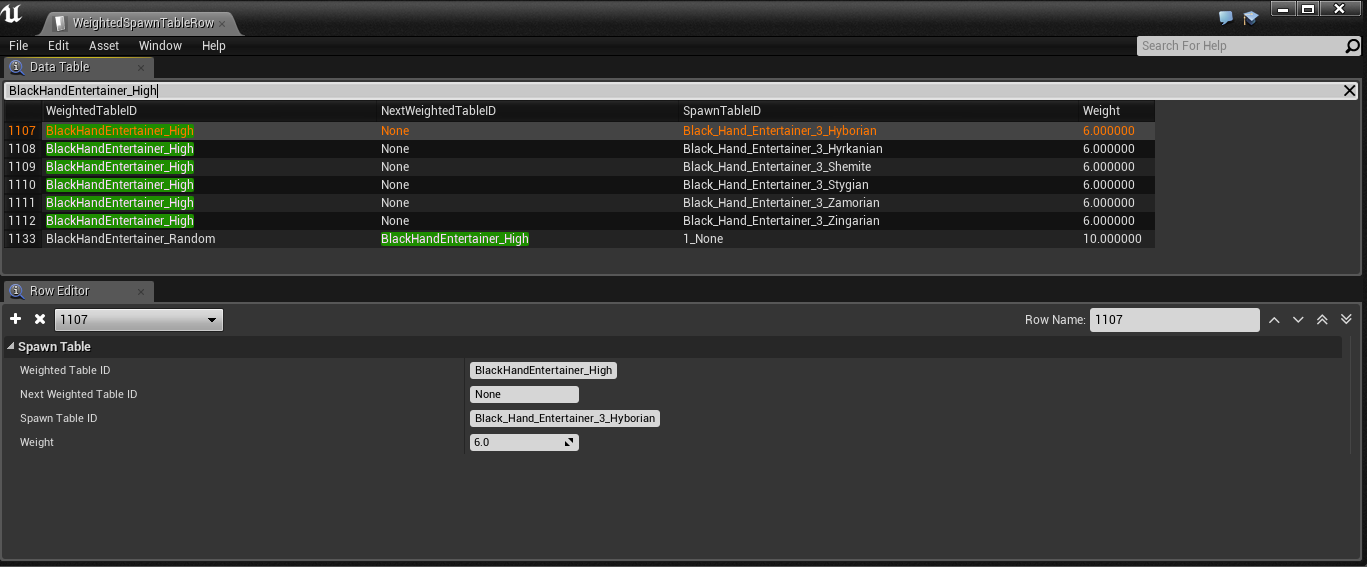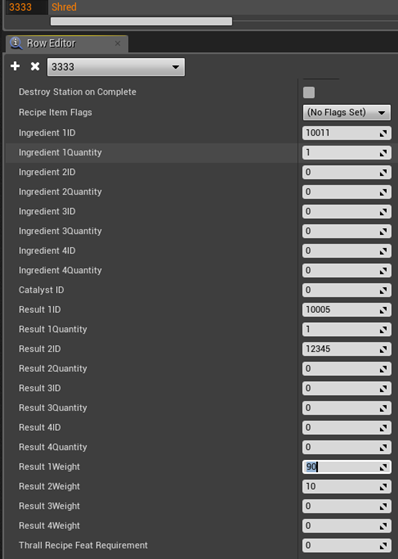About this primer
In this primer, we'll go through the concept of a weighted table, or to give it its full name; a "weighted chance" table. We will only briefly touch on parts of the game where it is implemented, such as the SpawnTables and the LootTables but this primer is geared more towards understanding the tables themselves and what they can do.
Uses of Weighted Tables in Conan Exiles
The two primary uses for weighted tables in Conan Exiles are the Spawning System and the Loot-Tables system. Any loot-table in the game as well as the WeightedSpawnTable uses Weighted Tables.
What are weighted tables?
Many may look at a weighted table and assume it's merely a percentage-based random-chance table. While this may be the case sometimes, it's not necessarily true. A pure "chance" table would need to have all the numbers add up to 100% whereas a weighted table doesn't work like that.
Note that many of the tables in Conan Exiles may actually add up to 100 but that is more out of convenience than necessity.
A weighted table allows you to assign a specific weight (or significance) to an entry. When the table is accessed, the system them pours all those weights into a single pool and randomly selects between them.
This makes it very easy to add new entries to such tables as you don't necessarily need to change the already existing values. If you want to add another entry, simply make a new table, attach it with the mod-controller, and assign a new weight to your entry, and any attempt to call said entry will randomly select yours.
Example #1 - WeightedSpawnTableRow
In this example, you can see that there are multiple entries of the "BlackHandEntertainer_High" and that they point to different specific SpawnTableID's. Also note that all these have the exact same weight (6 in this case). This means that there is an equal chance of spawnening either of these entries when the "BlackHandEntertainer_High" is called.
Mathematically, in this case, each entry has a 6 in (6+6+6+6+6+6) = 36 chance of spawning. If we changed the Black_Hand_Entertainer_3_Shemite to be 1000, all other entries would now have a 6 in (6+6+6+6+6+1000) =1030 chance of spawning, whereas the Shemite would have a 1000/1030 chance of spawning (in other words, a 97.08737%...(etc) chance of spawning.
If you instead ADDED a new entry with the same value (6) as all the others, you would now seamlessly add a new entry to the list with the exact same spawn chance as the rest of the entries.
Example #2 - RecipesTable
In the recipes-table there are random outcomes - these are dependant on weights as well, and works as follows:
Let's say that you have made a new recipe called "Shred "that turns "Wood" into "Bark" and "Coarse Powder". You want the ingredient you put in (Wood) to sometimes produce Bark, and sometimes produce Coarse Powder. The table could look something like this:
As you can see, the Ingredient is Wood (ID 10011) and the Result1ID is Bark. Result2ID is our new resource "Coarse Powder".
For weights, we have put down 90 for ResultItem1, and 10 for ResultItem2.
This means that any craft of this recipe has a 90/100 (90%) of spawning ResultItem1, and a 10/100 (10%) of spawning ResultItem2.
Add all the weights together, and you end up with a number (in this case, 90+10=100). Then take the actual weight of each entry and divide it by the number you have and you will get the actual percentage chance you have of spawning that entry.
As an example, if we had put Result1Weight to be "177" and ResultWeight2 to be "853", it would work out like this:
177+853 = 1030
177/1030 = 0.1718..... = 17%
853/1080 = 0.8281.... = 83%
Nested tables - a quick note
It's worth noting that many tables that use this method in Conan Exiles also use Nested Tables. In the example above, you may have noticed the "NextWeightedTableID" - if you have an entry here pointing to another weighted table, you can make quite extensive hierarchies for tables. You can see this happening in the Spawn Table if you look below the marked green rows in the first image, where the "BlackHandEntertainer_Random" and ""BlackHandEntertainer_RandomLegendary" points to other sections of this table as well.

